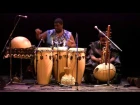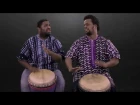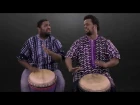Amadou Kienou | nl
Mamadou Diabaté was born in 1975 in Kita, a Malian city long known as a center for the arts and culture of the Manding people of West Africa. As the name Diabate indicates, Mamadou comes from a family of griots, or jelis as they are known among the Manding. Jelis are more than just traditional musicians. They use music and sometimes oratory to preserve and sustain people's consciousness of the past, a past that stretches back to the 13th century when the Manding king Sunjata Keita consolidated the vast Empire of Mali, covering much of West Africa. The stories of...
Driven by the underlying rythums that make up the fabric of his Exsistence, Mamadou Kante' upholds the meaning,... the meaning of "being true to yourself" , which embodies your soul.. giving his delivery to these rythums a potent consiousness! .
Amadou and Mariam are a musical duo from Mali, composed of the couple Mariam Doumbia (vocals) (born in Mali's capital Bamako 15 April 1958) and Amadou Bagayoko (guitar and vocals) (born in Bamako 24 October 1954). The pair, known as "the blind couple from Mali" met at Mali's Institute for the Young Blind, and found they shared an interest in music.
The duo produces music that mixes traditional Mali sound with rock guitars, Syrian violins, Cuban trumpets, Egyptian ney, Colombian trombones, Indian tablas and Dogon percussion. All these elements put together have been referred to as "Afro-blues".
In 2004 they...
Mamadou Alioune Barry was born in 1947, in Guinea —then a French colony. His father played the accordion and drums in one of the most famous orchestras of that time, Le Pavillon Bleu, in Kindia. He taught Mamadou his first lessons and passed on to him his passion for music. Mamadou Barry is a multi-instrumentalist —he not only plays tenor, alto and soprano sax but also flute and percussion — as well as a fine connoisseur of all the sub-region’s rhythms and music styles. Open to all musical trends, he has insisted on self-producing his first album Niyo under his...




